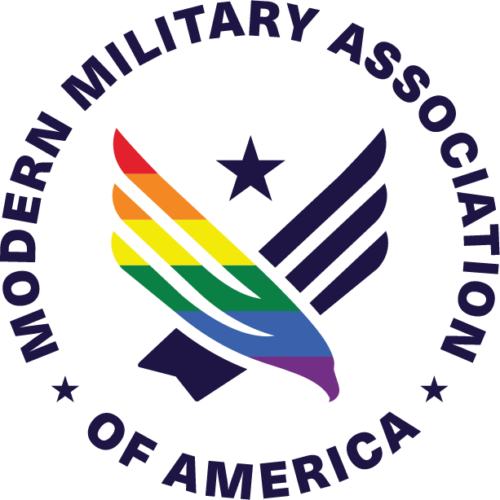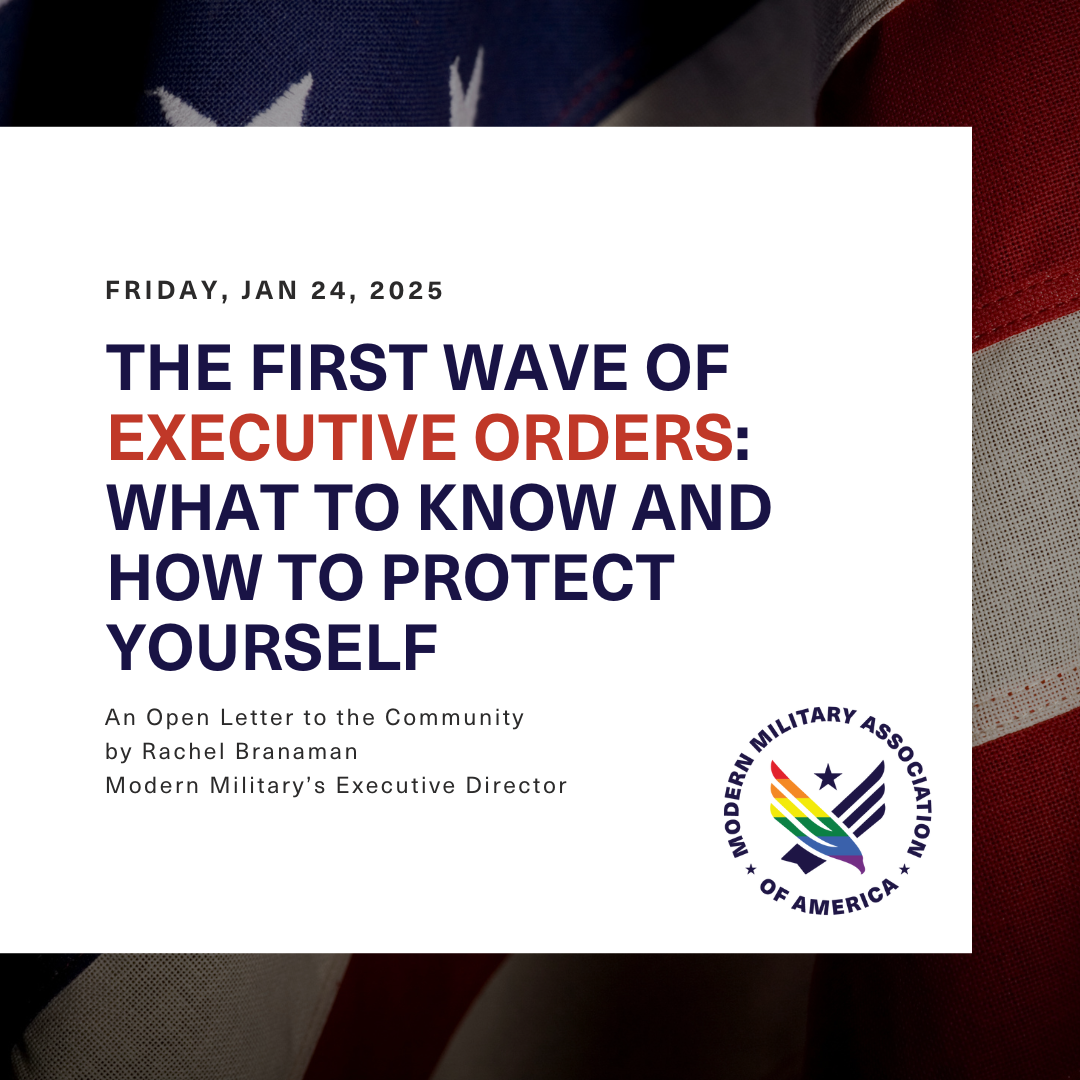To Our Entire Community,
At Modern Military, we share in your heartbreak and fear following the first wave of Executive Orders signed this week. It’s profoundly upsetting to see hard-won rights, protections, and programs being dismantled so swiftly by the new administration.
We are deeply troubled by the cynical efforts to target the LGBTQ+ community, which are not only cruel but also discriminatory, going against both science and democratic values. Further, we must consider the potential impact of many of these orders on the broader veteran and military community.
The Executive Orders We’re Monitoring Closely
1. The executive order addressing “gender ideology” and aiming to restore “biological truth” to the federal government limits the federally recognized sexes to “male” and “female” based on reproductive cells, asserting that sex cannot be changed. This order conflicts with current scientific understanding and may affect the recognition of transgender, non-binary, and intersex individuals under federal law. It could also lead to requirements for individuals to list their birth sex on all government documents. While the full impact of this order on military job security and the provision of medically necessary healthcare is not yet clear, it may have significant implications.
2. A series of executive orders that could lead to the activation of the military for mass deportation and border security enforcement. These orders raise concerns about the legal and ethical implications of using the military in such operations, and could present challenges for service members who may face difficult decisions in carrying out tasks that conflict with their personal values.
3. A series of executive orders which called for the immediate cessation and audit of Diversity, Equity, and Inclusion (DEI) programs at the federal level, while also requiring the Office of Management and Budget to compile lists of federal contractors or grantees involved in DEI-related education and programming.
The broad dismantling of DEI efforts, which includes hiring and contracting opportunities for veterans and military spouses, is troubling. There are concerns that these lists could be used to create blacklists that might limit future funding opportunities. There is particular concern about federal agencies instructing employees to report any concealed DEI activity within 10 days, with warnings of potential consequences, which could encourage internal surveillance and create a climate of fear.
4. The executive order that undoes Civil Rights-era rules, which have long aimed to prevent discrimination and promote equal opportunity, may impact government practices and standards. Military Equal Opportunity offices are an essential resource for service members facing discrimination. Although no immediate changes have been officially announced, there are reports suggesting that military Equal Opportunity offices and related initiatives may be reassessed as part of a broader push to limit DEI (Diversity, Equity, and Inclusion) efforts. This has raised concerns about the potential effects on service members from marginalized or minority communities, who could face challenges in reporting or addressing discrimination. Additionally, the executive order signals a possibility of similar actions affecting DEI initiatives in the private sector.
5. The executive order that examines efforts to address misinformation, disinformation, or malinformation, framing such initiatives as potentially infringing on free speech and constitutional rights. Reports suggest that federal actions regarding DEI-related content have led to questions about how “free speech” is being interpreted by the current administration. For instance, military public affairs offices have been directed to limit official social media posts to topics related to the Southern border. Additionally, there are reports of requests to remove DEI-related content, including Pride Month observances, from official military websites and DVIDS — the Department of Defense’s news and media portal. These actions have raised concerns among some service members, particularly in the LGBTQ+ community, who feel that the removal of content recognizing their identities and contributions may diminish their visibility and history within the military.
6. The executive order that directs federal workers to return to full-time, in-person office work, with some exceptions, such as approved arrangements for military spouses stationed abroad. This shift may impact federal employees who have long relied on remote work opportunities, including many veterans. For example, some VA employees, responsible for tasks such as processing claims and staffing crisis phone lines, work fully remotely and could face challenges if required to transition to full-time office work. This could potentially affect the availability of support services for veterans. Additionally, with over 600,000 veterans employed as federal workers, the policy may have broader implications for the veteran community.
What You Need To Know About Executive Orders
It’s important for the LGBTQ+ community, especially the LGBTQ+ military community, to keep a few things in mind as these orders inundate the news cycle and test the legal and administrative landscape of the country:
1. The overwhelming pace and vagueness of announcements: These tactics can feel confusing and disempowering, but they are often intended to pressure agencies into prematurely defining compliance. Avoid reacting preemptively before clear policies and implementation plans are established.
2. Limited immediate impact: Many executive orders are not yet implemented or enforceable. For instance, while some orders have revoked previous policies, experts note that this may not result in immediate changes. Anticipated challenges, such as potential restrictions on transgender service, are being monitored, and advocacy efforts are prepared to respond.
3. Legal challenges are underway: Many of these executive orders are expected to face lawsuits that could delay or prevent their enforcement. Legal processes take time, but they remain a significant avenue for opposition.
4. Uncertainty remains: The language in many orders is vague, requiring time for policy experts and agencies to interpret their legality and application. Updates will be shared as more information becomes available.
As the Human Rights Campaign emphasizes, it’s important not to grant the administration more power than it holds. Advocacy groups are working diligently to navigate these developments and protect the community. Remember, we are stronger together.
What You Can Do To Protect Yourself and Others
1. Report discrimination when you see it. Reports of increased prejudicial language and actions targeting LGBTQ+ service members have emerged following these Executive Orders. Reporting discrimination, whether experienced or observed, helps Modern Military address concerns within the global U.S. military community and provide better support for LGBTQ+ and HIV+ service members, veterans, and their families. Our reporting form allows you to do so anonymously.
2. Join community peer groups. This is going to be a rough road for us to travel. Do not be afraid to connect with friends, family, community groups, or therapists who understand and support you. Consider joining Modern Military’s Strong Communities safe, virtual, peer-moderated monthly meetings for adult LGBTQ+ service members, veterans, and their partners to find fellowship, resources, and support.If you are struggling with mental health concerns, LGBTQ+ veterans and qualifying family members can join upcoming Resiliency Circles. For military families with LGBTQ+ children, we have peer-facilitated support groups in partnership with PFLAG
3. Build resilience and practice self-care. Find time to engage in activities that bring you joy and relaxation. Limit exposure to news consumption and find ways to disconnect from the 24-hour news cycle which will exacerbate anxiety and depression. Identify coping strategies that work for you and explore new ones. Some resources to get you started:
– 5 Ways to Manage Politically Induced Stress
– DBT Distress Tolerance: Exercises, Videos, and Worksheets
– Mental Health Crisis Services That Do Not Use Police Intervention
4. Find community allies. Identify community organizations, legal funds, mutual aid, and other resources. Modern Military is curating and continually updating our legal referrals, regional community resources, and health and wellness resources. State and local groups can offer the most current information on relevant laws and advise on how to address new challenges. Modern Military private and secret groups are available based on location or identity traits. Connect with us to be added to secret groups.
5. Get involved. Start by following reliable news sources on legislation and policy changes, contact your representatives to voice your concerns and advocate for your rights, and join in on in-person or virtual activism activities. You can learn more about the issues we are fighting for on behalf of the LGBTQ+ military and veteran community on our advocacy agenda. We also compiled tips on how to advocate, volunteer, build community and awareness to advance fairness and equality.
6. Support causes and organizations that align with your values. Join Modern Military, SPARTA, and Minority Vets in our efforts to protect LGBTQ+ service members and veterans from discrimination. During challenging times, we are “banning together” to share resources and build community rather than competing for funding because all of our work is vital to the community. Your support fuels advocacy, support programs, and legal efforts to ensure everyone can serve with pride and dignity. Donate now to help create a more inclusive military for all. Learn more: Banned Together Military.
We will keep pushing forward and fighting for you every step of the way.
In Solidarity,
Rachel Branaman
Executive Director of Modern Military
P.S.: Know a veteran who’s struggling? Free help available here.
Sponsored by the SSG Fox Suicide Prevention Program.


